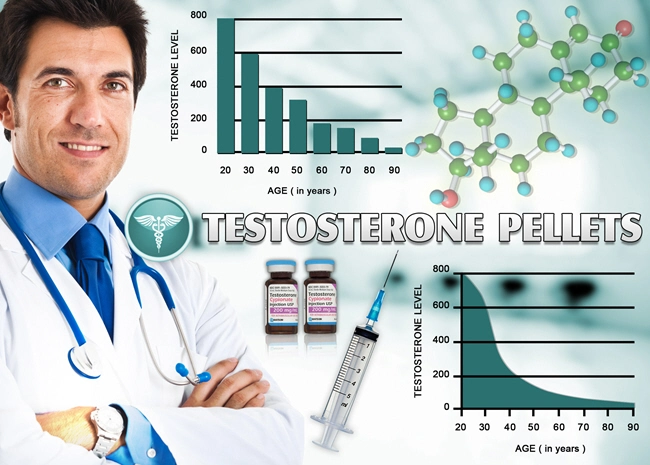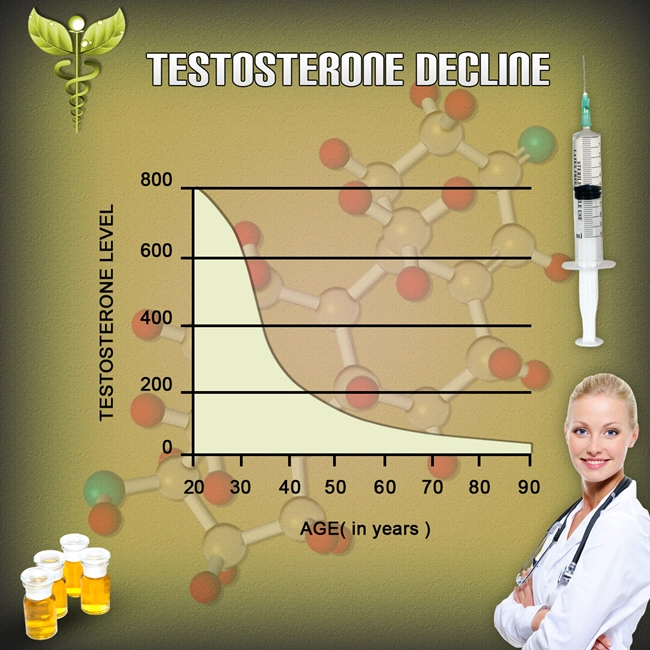
Introduction to Testosterone Enanthate
Testosterone Enanthate, a synthetic form of the primary male sex hormone, has been traditionally utilized in the management of hypogonadism and delayed puberty. Recent studies, however, have begun to explore its broader therapeutic applications, particularly in the realm of neurological health among American males. This article delves into the emerging evidence supporting the use of Testosterone Enanthate in managing various neurological disorders.
The Link Between Testosterone and Neurological Health
Testosterone, beyond its well-known roles in sexual and reproductive health, exerts significant effects on the nervous system. It influences neuronal survival, neurogenesis, and synaptic plasticity, which are crucial for maintaining cognitive function and potentially mitigating the progression of neurological diseases. As men age, a natural decline in testosterone levels may correlate with an increased risk of developing conditions such as Alzheimer's disease, Parkinson's disease, and other forms of dementia.
Testosterone Enanthate in Alzheimer's Disease
Research into Alzheimer's disease has shown that testosterone may play a protective role against the neurodegenerative processes associated with this condition. Studies have indicated that men with higher testosterone levels may have a reduced risk of developing Alzheimer's. In clinical settings, Testosterone Enanthate has been explored as a potential therapeutic agent to slow cognitive decline in men with mild cognitive impairment or early Alzheimer's disease. While results are promising, larger and more comprehensive trials are needed to establish its efficacy and safety definitively.
Potential Benefits in Parkinson's Disease
Parkinson's disease, characterized by the progressive loss of dopaminergic neurons, presents another area where Testosterone Enanthate might offer benefits. Preliminary research suggests that testosterone can enhance dopamine synthesis and protect against neuronal loss. A few small-scale studies have reported improved motor function and quality of life in men with Parkinson's disease following testosterone supplementation. However, these findings are preliminary, and further research is essential to validate these observations and determine the optimal dosing and treatment duration.
Exploring Other Neurological Conditions
Beyond Alzheimer's and Parkinson's, Testosterone Enanthate is being investigated for its potential role in other neurological conditions. For instance, its neuroprotective properties might be beneficial in managing traumatic brain injuries and stroke, where rapid neuronal loss and inflammation are critical issues. Additionally, there is interest in its potential to alleviate symptoms of multiple sclerosis, a chronic autoimmune disorder affecting the central nervous system.
Safety and Side Effects
While the potential benefits of Testosterone Enanthate in neurological health are exciting, it is crucial to consider its safety profile. Common side effects include acne, increased red blood cell count, and potential cardiovascular risks. Long-term use requires careful monitoring to mitigate these risks. Furthermore, the use of testosterone supplementation in men without hypogonadism remains controversial, and any off-label use should be approached with caution and under strict medical supervision.
Conclusion and Future Directions
The exploration of Testosterone Enanthate's role in managing neurological disorders among American males represents a promising frontier in medical science. While current evidence is encouraging, it remains preliminary, and more robust clinical trials are needed to establish its therapeutic potential fully. As research progresses, it is hoped that Testosterone Enanthate will become a valuable tool in the neurologist's arsenal, offering new hope to men suffering from debilitating neurological conditions.
In summary, the journey of Testosterone Enanthate from a hormone replacement therapy to a potential neuroprotective agent underscores the importance of continued research and innovation in medical science. As we move forward, it is essential to balance the enthusiasm for these potential benefits with a rigorous approach to safety and efficacy, ensuring that any new treatments are both effective and safe for American males.
Contact Us Today For A Free Consultation
Dear Patient,
Once you have completing the above contact form, for security purposes and confirmation, please confirm your information by calling us.
Please call now: 1-800-380-5339.
Welcoming You To Our Clinic, Professor Tom Henderson.

- Testosterone Enanthate: Benefits, Risks, and Ethics in American Male Athletes' Performance [Last Updated On: February 19th, 2025] [Originally Added On: February 18th, 2025]
- Testosterone Enanthate: Enhancing Muscle, Reducing Fat for Weight Management in American Men [Last Updated On: March 17th, 2025] [Originally Added On: March 17th, 2025]
- Personalizing Testosterone Enanthate Therapy for Optimal Health Outcomes in American Men [Last Updated On: March 17th, 2025] [Originally Added On: March 17th, 2025]
- Testosterone Enanthate: A Solution for Sexual Dysfunction in American Males [Last Updated On: March 18th, 2025] [Originally Added On: March 18th, 2025]
- Testosterone Enanthate: Cycle, Benefits, Risks, and Legal Issues for American Athletes [Last Updated On: March 18th, 2025] [Originally Added On: March 18th, 2025]
- Testosterone Enanthate: A Promising Treatment for Depression in American Men [Last Updated On: March 18th, 2025] [Originally Added On: March 18th, 2025]
- Testosterone Enanthate: Enhancing Cognitive Function in American Men [Last Updated On: March 19th, 2025] [Originally Added On: March 19th, 2025]
- Testosterone Enanthate: Impacts on Prostate Health in American Males [Last Updated On: March 19th, 2025] [Originally Added On: March 19th, 2025]
- Testosterone Enanthate: Benefits, Risks, and Management for American Men [Last Updated On: March 19th, 2025] [Originally Added On: March 19th, 2025]
- Testosterone Enanthate's Impact on Sleep Quality in American Men: Benefits and Risks [Last Updated On: March 20th, 2025] [Originally Added On: March 20th, 2025]
- Long-term Testosterone Enanthate Use: Health Risks for American Men [Last Updated On: March 20th, 2025] [Originally Added On: March 20th, 2025]
- Testosterone Enanthate: A Promising Treatment for Osteoporosis in American Men [Last Updated On: March 21st, 2025] [Originally Added On: March 21st, 2025]
- Testosterone Enanthate: Medical Uses, Myths, and Performance Risks in American Males [Last Updated On: March 22nd, 2025] [Originally Added On: March 22nd, 2025]
- Testosterone Enanthate's Impact on Male Fertility: Insights for American Men on TRT [Last Updated On: March 22nd, 2025] [Originally Added On: March 22nd, 2025]
- Testosterone Enanthate: A Promising Therapy for Chronic Pain in American Males [Last Updated On: March 23rd, 2025] [Originally Added On: March 23rd, 2025]
- Testosterone Enanthate: Medical Uses, Cultural Perceptions, and Ethical Concerns in the U.S. [Last Updated On: March 23rd, 2025] [Originally Added On: March 23rd, 2025]
- Testosterone Enanthate: A Potential Aid in Stress Management for American Men [Last Updated On: March 23rd, 2025] [Originally Added On: March 23rd, 2025]
- Testosterone Enanthate: Enhancing Injury Recovery in American Males - Benefits and Risks [Last Updated On: March 23rd, 2025] [Originally Added On: March 23rd, 2025]
- Testosterone Enanthate: Enhancing Immune Function in American Men [Last Updated On: March 23rd, 2025] [Originally Added On: March 23rd, 2025]
- Testosterone Enanthate: Impacts on Hair Growth and Loss in American Men [Last Updated On: March 24th, 2025] [Originally Added On: March 24th, 2025]
- Testosterone Enanthate: Enhancing Vitality in Aging American Men [Last Updated On: March 24th, 2025] [Originally Added On: March 24th, 2025]
- Ethical Dilemmas of Testosterone Enanthate Use in American Males: Medical vs. Enhancement [Last Updated On: March 24th, 2025] [Originally Added On: March 24th, 2025]
- Optimizing Testosterone Enanthate Therapy: Dosage, Monitoring, and Lifestyle Integration [Last Updated On: March 24th, 2025] [Originally Added On: March 24th, 2025]
- Testosterone Enanthate's Impact on Appetite and Digestion in American Men [Last Updated On: March 24th, 2025] [Originally Added On: March 24th, 2025]
- Testosterone Enanthate: Enhancing Body Composition in American Males - Benefits and Risks [Last Updated On: March 24th, 2025] [Originally Added On: March 24th, 2025]
- Testosterone Enanthate's Impact on Vision and Eye Health in American Males: A Review [Last Updated On: March 24th, 2025] [Originally Added On: March 24th, 2025]
- Testosterone Enanthate's Impact on Blood Sugar Levels in American Men: A Comprehensive Analysis [Last Updated On: March 24th, 2025] [Originally Added On: March 24th, 2025]
- Testosterone Enanthate's Impact on Mental Clarity in American Males: Benefits and Risks [Last Updated On: March 24th, 2025] [Originally Added On: March 24th, 2025]
- Testosterone Enanthate: Enhancing Endurance in American Male Athletes - Benefits and Risks [Last Updated On: March 25th, 2025] [Originally Added On: March 25th, 2025]
- Testosterone Enanthate: Benefits, Limitations, and Management for American Men [Last Updated On: March 25th, 2025] [Originally Added On: March 25th, 2025]
- Testosterone Enanthate Withdrawal: Symptoms, Management, and Long-Term Considerations [Last Updated On: March 25th, 2025] [Originally Added On: March 25th, 2025]
- Testosterone Enanthate: A Promising Therapy for Obesity in American Males [Last Updated On: March 25th, 2025] [Originally Added On: March 25th, 2025]
- Testosterone Enanthate: A Dual Approach to Treating Anemia in Hypogonadal Men [Last Updated On: March 25th, 2025] [Originally Added On: March 25th, 2025]
- Testosterone Enanthate Therapy: Benefits and Risks for Men Over 50 [Last Updated On: March 25th, 2025] [Originally Added On: March 25th, 2025]
- Testosterone Enanthate Boosts Skin Elasticity in American Males: Benefits and Risks [Last Updated On: March 25th, 2025] [Originally Added On: March 25th, 2025]
- Testosterone Enanthate: Enhancing Mood in American Males with Low Testosterone [Last Updated On: March 26th, 2025] [Originally Added On: March 26th, 2025]
- Testosterone Enanthate's Impact on Joint Health in American Men: Benefits and Risks [Last Updated On: March 26th, 2025] [Originally Added On: March 26th, 2025]
- Testosterone Enanthate: Benefits, Risks, and Cost-Benefit Analysis for American Males [Last Updated On: March 27th, 2025] [Originally Added On: March 27th, 2025]
- Testosterone Enanthate: A Vital Therapy for Muscle Wasting in American Men [Last Updated On: March 27th, 2025] [Originally Added On: March 27th, 2025]
- Testosterone Enanthate's Impact on Liver Health in American Men: Monitoring and Management [Last Updated On: March 27th, 2025] [Originally Added On: March 27th, 2025]
- Testosterone Enanthate: A Potential Treatment for Chronic Fatigue Syndrome in American Males [Last Updated On: March 27th, 2025] [Originally Added On: March 27th, 2025]
- Testosterone Enanthate's Role in Managing Diabetes Among American Males [Last Updated On: March 28th, 2025] [Originally Added On: March 28th, 2025]
- Testosterone Enanthate Therapy: Enhancing American Veterans' Health and Well-being [Last Updated On: March 28th, 2025] [Originally Added On: March 28th, 2025]
- Testosterone Enanthate's Impact on Cardiovascular Endurance in American Men: Risks and Benefits [Last Updated On: March 28th, 2025] [Originally Added On: March 28th, 2025]
- Testosterone Enanthate: A Novel Approach to Managing Allergies in American Males [Last Updated On: March 28th, 2025] [Originally Added On: March 28th, 2025]
- Testosterone Enanthate: Enhancing Post-Surgical Recovery in American Men [Last Updated On: March 28th, 2025] [Originally Added On: March 28th, 2025]
- Testosterone Enanthate's Impact on Dental Health in American Males: A Comprehensive Review [Last Updated On: March 28th, 2025] [Originally Added On: March 28th, 2025]
- Testosterone Enanthate Therapy: Impacts on Life Expectancy and Quality of Life in Men [Last Updated On: March 28th, 2025] [Originally Added On: March 28th, 2025]
- Testosterone Enanthate: A Promising Treatment for Autoimmune Disorders in American Males [Last Updated On: March 29th, 2025] [Originally Added On: March 29th, 2025]
- Testosterone Enanthate's Impact on Hearing Health in American Men: A Review [Last Updated On: March 29th, 2025] [Originally Added On: March 29th, 2025]
- Testosterone Enanthate: Enhancing Respiratory Function in American Men [Last Updated On: March 30th, 2025] [Originally Added On: March 30th, 2025]
- Testosterone Enanthate Therapy: Impacts on Kidney Function in American Males [Last Updated On: March 30th, 2025] [Originally Added On: March 30th, 2025]
- Testosterone Enanthate: Emerging Treatment for Gastrointestinal Disorders in American Males [Last Updated On: March 31st, 2025] [Originally Added On: March 31st, 2025]
- Testosterone Enanthate: Enhancing Neurological Health in American Men [Last Updated On: April 3rd, 2025] [Originally Added On: April 3rd, 2025]
- Testosterone Enanthate: A New Approach to Managing Hypertension in American Males [Last Updated On: April 3rd, 2025] [Originally Added On: April 3rd, 2025]
- Testosterone Enanthate: Benefits, Fertility Risks, and Hormonal Impact in American Males [Last Updated On: April 4th, 2025] [Originally Added On: April 4th, 2025]
- Testosterone Enanthate's Role in Managing Respiratory Disorders in American Males [Last Updated On: April 6th, 2025] [Originally Added On: April 6th, 2025]
- Testosterone Enanthate's Impact on Adrenal Health in American Males: A Comprehensive Analysis [Last Updated On: April 7th, 2025] [Originally Added On: April 7th, 2025]
- Testosterone Enanthate's Impact on Immune Function in American Males: A Comprehensive Review [Last Updated On: April 8th, 2025] [Originally Added On: April 8th, 2025]
- Testosterone Enanthate Therapy: Benefits, Risks, and Endocrine System Management [Last Updated On: April 9th, 2025] [Originally Added On: April 9th, 2025]
- Testosterone Enanthate Therapy's Impact on Thyroid Function in American Men [Last Updated On: April 9th, 2025] [Originally Added On: April 9th, 2025]
- Testosterone Enanthate: Emerging Dermatological Benefits for American Men [Last Updated On: April 9th, 2025] [Originally Added On: April 9th, 2025]
- Testosterone Enanthate's Impact on Cardiovascular Health in American Males: A Review [Last Updated On: April 10th, 2025] [Originally Added On: April 10th, 2025]
- Testosterone Enanthate: Enhancing Musculoskeletal Health in American Men [Last Updated On: April 10th, 2025] [Originally Added On: April 10th, 2025]
- Testosterone Enanthate's Impact on Gastrointestinal Health in American Males [Last Updated On: April 11th, 2025] [Originally Added On: April 11th, 2025]
- Testosterone Enanthate: Enhancing Hematological Health in American Men [Last Updated On: April 12th, 2025] [Originally Added On: April 12th, 2025]
- Testosterone Enanthate: Managing Metabolic Disorders in American Males [Last Updated On: April 12th, 2025] [Originally Added On: April 12th, 2025]









